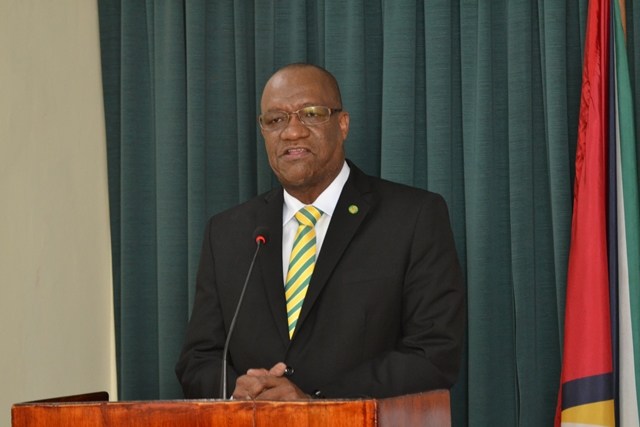Leader of the Opposition Joseph Harmon has once again criticized the PPP/C government for failing to make public the accords signed with US Secretary of State Mike Pompeo.
Speaking at a press conference today Harmon highlighted media reports that US$60b was available through the International Development Finance Corporation (IDFC), the United States’ development bank.
While he welcomed the impact it is intended to have on the development of Guyana and Guyanese, Harmon stressed that the agreement and its terms should’ve been made public since it was signed with Pompeo.
“This regime has signed such an agreement and the ordinary people of Guyana are unaware of the full terms and conditions of it, the payment to be made and the impact of any investment which will have a direct effect on their lives, and the issue of default,” he stressed.
He endorsed the concerns raised by former Minister of Finance Winston Jordan who has cautioned that Guyana should be wary of Americans bearing gifts.
“Care and extreme caution should be exercised as you engage new sources of funding,” Jordan said in a letter published in today’s Stabroek News.
In the letter, the former finance Minister explained that following some research he has found key costs associated with these “gifts” would include an upfront Retainer Fee; Facility/Organisation Fee; Commitment Fee; Interest Rate; Maintenance Fee as well as other Fees related to the cost of the services of outside consultants or attorneys that may be required by IDFC, related funding costs, and any expenses related to registration or notarisation of documents.
Jordan noted that the preponderance of fees associated with financing obtained from the IDFC would result in elevated borrowing costs and highlighted the fact that the IDFC classifies Guyana as an upper middle-income country.
“This likely means that any financing provided would be on non-concessional terms characterised by high and potentially variable interest rates and relatively short repayment periods,” he said.
Additionally, Jordan has noted that the means by which financing is obtained from the IDFC is unclear, since it is stated on the entity’s website that the IDFC “complements, rather than competes, with private sector lenders and supports projects that have been unable to obtain sufficient support from private lenders”.
Based on the nature of projects in Latin American countries like Brazil, Colombia and El Salvador that are highlighted on its website, it appears as though the IDFC either provides financing to US companies, which would then be used to undertake projects in developing countries; or, provides supplemental development financing to countries in cases where there is either a lack of private sector capacity or inclination to provide financing, he postulated, adding that once approved for financing, the IDFC will make a project-by-project determination of loan amount, usually not more than 80% of the total cost of the project.






